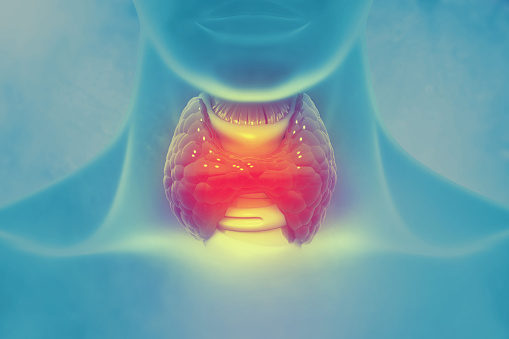The thyroid gland is located in the lower part of the front of the neck. It is responsible for the formation and secretion of thyroid hormones. Around 90% of the hormone made by the thyroid gland is thyroxine (T4) which is inactive, and 10% is the active thyroid hormone called triiodothyronine (T3). T4 is released from the thyroid gland into the blood and is transported to different parts of the body. During the transport, T4 is converted into T3, which performs the functions of the thyroid hormones (such as controlling heart rate, metabolism, respiration, heat production, alertness, and other brain functions).
Hypothyroidism is a condition in which the thyroid gland does not produce a normal amount of thyroid hormones: thyroxine (T4) and triiodothyronine (T3).
Common causes include:
- Hashimoto’s thyroiditis (the main cause of hypothyroidism in the developed world)
- Iodine deficiency (a major cause in under-developed countries)
- Surgical removal of thyroid hormone
- After radioactive iodine treatment of the thyroid gland
- After radiation therapy for head and neck cancers
- Side effects of certain medications (Amiodarone, Lithium, certain cancer drugs)
- Post-partum thyroiditis (after pregnancy)
Hashimoto’s Disease:
Normally, your immune system helps the body limit or eliminate infections. It does this by identifying cells that are foreign to your body, like viruses and bacteria. When these foreign cells enter your body, your immune system sends out protector cells (called T-cells & B-cells), T-cells directly or indirectly attack foreign cells while the B-cells do that by producing and releasing a protein called antibodies. Antibodies then tag these cells and mark them to be attacked by other cells of the immune system.
In Hashimoto’s disease, your thyroid gland is recognized as foreign (by mistake) and is attacked and damaged. As a result, thyroid hormone production starts to decline and ultimately leads to symptoms of hypothyroidism. In most patients, there is a period during which the thyroid gland may be enlarged or blood antibodies against the thyroid gland may be present, and yet you may not have any symptoms. This asymptomatic period is variable in different patients but typically lasts for several years. Most patients are diagnosed between the ages of 30 to 50 years, but some patients develop it before or after this period.
When symptoms occur, they do so gradually and may go unnoticed for a while.
Typical symptoms may include:
- Fatigue
- Feeling excessively cold
- Weight gain
- Constipation
- Hair getting coarse and brittle.
- Dry skin
- Brittle nail
- Slow heart rate
- Mental fog
- Heavy menstrual bleeding
- Slow reflexes
- Fluid retention
- Enlarged thyroid gland (called goiter)
The TSH test:
The thyroid stimulating hormone (TSH) test measures the level of this hormone in your blood. is a simple blood test that measures the amount of thyroid-stimulating hormone in your blood. TSH is produced by your pituitary gland to signal your thyroid to release more or less thyroid hormone. It is the most accurate test of thyroid function as it reflects the brain’s response to blood thyroid hormone levels. Blood TSH levels show thyroid problems before T4 or T3 levels become abnormal.
If you have a highTSH, it usually means your pituitary (brain) senses that there is not enough thyroid hormone in your blood, and it is trying to get the thyroid gland to make more. High TSH levels indicate hypothyroidism.
Therefore:
Early Hypothyroidism: TSH is high.
T4 & T3 are normal.
Later in Hypothyroidism: TSH is high.
T4 is low or low normal.
T3 may be low or low normal.
Thyroid Antibody levels:
Patients with Hashimoto’s thyroiditis have antibodies against the thyroid gland in their blood. Sometimes doctors may measure the levels of these antibodies (thyroid peroxidase antibody and anti-thyroglobulin antibody) to ascertain the diagnosis of Hashimoto’s thyroid disease. Once the diagnosis is established, further monitoring of these antibody levels does not provide any useful information and should generally be avoided. 5-10% of normal individuals have low levels of these antibodies. The presence of antibodies does not always mean they have Hashimoto’s thyroiditis.
Treatment of hypothyroidism:
Hypothyroidism is treated with thyroid hormone replacement therapy, replacing the thyroid hormones that your body cannot produce on its own. A synthetic form of thyroxine (T4) is recommended. The medication is absorbed in the intestine and moves into the blood circulation, where it is converted to the active form of thyroid hormone called triiodothyronine (T3). Available formulations of thyroxine in the US include Synthroid® (levothyroxine sodium tablets, USP). Other brand versions include Levoxyl®, Tirosint®, and Unithroid®.
Some patients feel better if a small dose of T3 (Liothyronine or Cytomel®) is added to the T4 treatment.
Several older thyroid formulations are still available and are occasionally prescribed. They are derived from the “crushed up” porcine (pig) thyroid gland and are called desiccated thyroid extracts. Examples include Armour® Thyroid, NP Thyroid, and Nature thyroid. Because the ratio of T3 and T4 in pigs is quite different compared to humans, these medicines require very careful monitoring and dose adjustments. Most thyroid experts do not recommend these preparations because the potential for overtreatment is higher.
Thyroid hormone therapy should restore blood thyroid levels to normal. After treatment is started and after each adjustment of dose, blood thyroid level should be checked (typically after 6-8 weeks).
Some of the things to keep in mind regarding thyroid treatment are:
- Thyroid medication should be taken 30 -60 min before a meal, on an empty stomach. Most patients take it in the morning.
- If you are taking vitamins or minerals (such as calcium, magnesium, potassium, iron, or zinc), take them 4 hours after thyroid hormones.
- It may take several months to figure out the dose your body needs. Repeat testing is needed to make sure your thyroid hormone levels are just right. This is necessary to avoid overtreatment or undertreatment. If your blood TSH level is less than 0.4 mU/l, it means you are on too much medicine and it needs to be adjusted.
- Overtreatmentmay lead to serious complications over time such as osteoporosis or bone loss. Serious heart rhythm abnormalities such as atrial fibrillation can also occur, increasing the risk of stroke and heart failure. Unless grossly overtreated, you may not have any symptoms or warning signs before major complications occur.
- Because your need for thyroid hormones may change, your doctor will continue to test your thyroid hormone levels at least once or twice a year and adjust your dose accordingly.
- Thyroid requirements usually increase during pregnancy and therefore you must contact your physician as soon as you find out you are pregnant.
- The goal is to keep your TSH levels in patients with hypothyroidism between 0.5 and to 4mU/l. Many experts consider the normal range to be 0.5 to 2.5 mU/l. Your physician will advise as to what target TSH to aim for depending on your specific circumstances.
- If your thyroid levels are normal and you continue to have fatigue, weight problems, mood swings, feeling cold, dry skin, or brittle nails, you may have another medical problem that causes similar complaints. These conditions may include anemia, depression or anxiety, sleep apnea, perimenopause, pre-menstrual tension, chronic fatigue, and fibromyalgia. If after treatment, you have residual symptoms and your TSH and thyroid hormone tests are normal, your physician should evaluate you for other coexisting conditions.
For further information: www.thyroid.org or www.endocrineweb.com
For further information: www.thyroid.org or www.endocrineweb.com
This information is for general knowledge & is not a substitute for medical advice from your doctor.
Post Disclaimer
We are not your healthcare provider, and your use of this website does not establish a patient-client relationship. All the information contained on this website is for informational purposes only. No material on this site is intended to be a substitute for professional medical advice (diagnosis, treatment, testing or nutritional information). Always seek the advice of your physician or qualified healthcare provider with any questions you may have regarding medical or health-related conditions or treatment. Your healthcare provider knows your condition or situation well and can give you specific advice which would be appropriate for your condition/situation. Your healthcare provider can also guide you more accurately about injection techniques, dietary interventions and the use of medical technology that is most pertinent and suitable for you. Please do not disregard professional medical advice or delay in seeking it because of something you may have read on this website.

